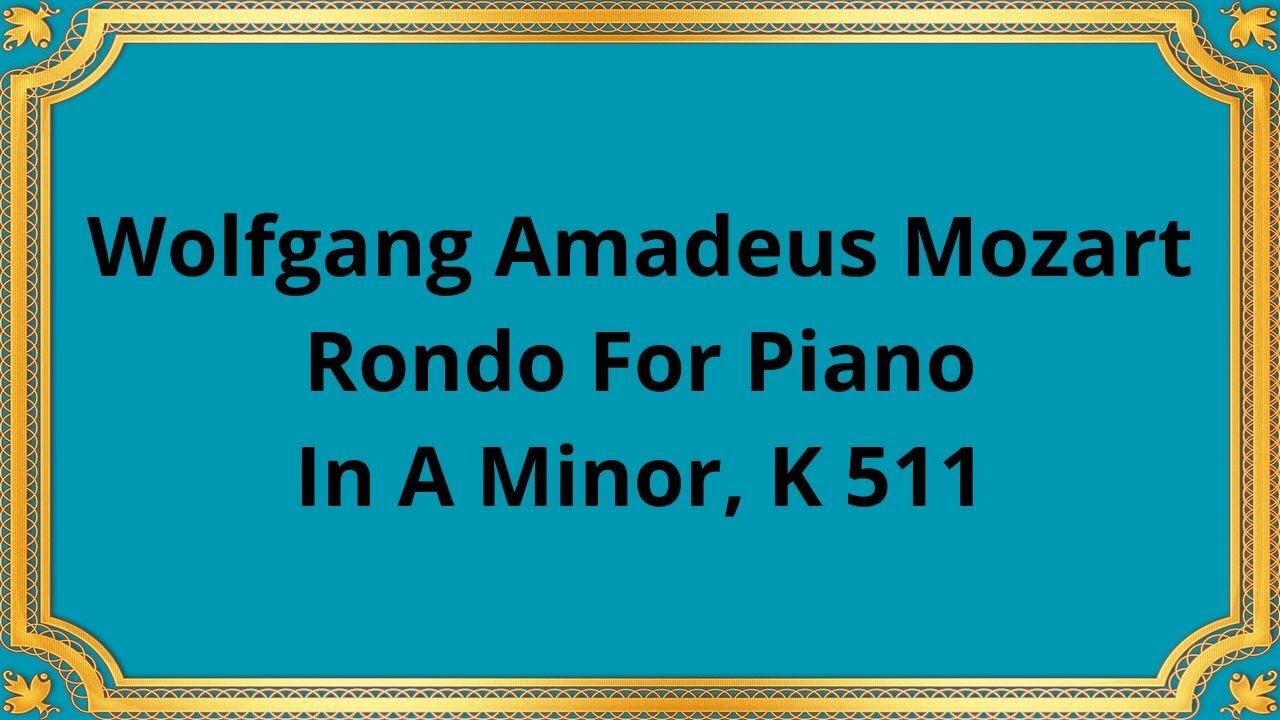Premium Only Content

Wolfgang Amadeus Mozart Rondo For Piano In A Minor, K 511
#Mozart#Chamber_music#Classical_music#Sonata#musical_composition
Publication date 1950
Played by WALTER HENDL and LUKAS FOSS
Wolfgang Amadeus Mozart is a legendary composer who has made an indelible mark on classical music history. Among his many works, the Rondo for Piano in A Minor, K 511 stands out as a masterpiece. This article will delve into the background and significance of this timeless piece of music.
Mozart composed the Rondo for Piano in A Minor, K 511 in 1787, during a period of personal and financial difficulty. He had just lost his father, who had been his biggest supporter and had managed his affairs, leaving Mozart to deal with a mountain of debt. Despite these challenges, Mozart produced some of his most profound works during this time, including the Rondo for Piano in A Minor.
The Rondo for Piano in A Minor, K 511 is a solo piano piece that is approximately ten minutes long. It is written in ABA form, with the A section being in A minor and the B section in A major. The A section is characterized by its melancholic and introspective melody, while the B section is more hopeful and uplifting. The piece ends with a return to the A section, but this time with a more triumphant and resolved tone.
The Rondo for Piano in A Minor, K 511 is significant for several reasons. First, it is an excellent example of Mozart's ability to convey complex emotions through music. The piece's contrasting sections reflect Mozart's own emotional turmoil during its composition, as he struggled with personal and financial hardships. Second, the Rondo for Piano in A Minor is often cited as an example of Sturm und Drang, a movement in German literature and music that emphasized intense emotions and rebellion against traditional artistic conventions. Finally, the piece's technical demands and expressive qualities have made it a favorite of pianists and audiences alike.
Conclusion
The Rondo for Piano in A Minor, K 511 is a masterpiece of classical music that continues to captivate audiences today. Its complex emotions, technical demands, and historical significance make it a worthy addition to any music lover's collection. Mozart's enduring legacy as a composer is exemplified in this piece, which showcases his unmatched ability to convey powerful emotions through music.
-
 34:26
34:26
Classical music_Music Inspiration
1 month agoAram Khachaturian Concerto for Violin and Orchestra
872 -
 28:40
28:40
SLS - Street League Skateboarding
8 days agoTOP MOMENTS IN WOMEN’S SLS HISTORY! ALL THE 9’s - Rayssa Leal, Leticia Bufoni, Chloe Covell & more…
2.92K -
 23:00
23:00
Exploring With Nug
13 hours ago $1.52 earnedHis Truck Was Found Crashed in the Woods… But He’s Gone!
48.1K4 -
 27:09
27:09
MYLUNCHBREAK CHANNEL PAGE
14 hours agoDilmun: Where Life Never Ends
49.7K36 -
 DVR
DVR
Slightly Offensive
7 hours ago $10.24 earnedHas Trump FAILED US? The ABSOLUTE STATE of The Right Wing | Guest: Nick Fuentes
47.4K33 -
 1:37:05
1:37:05
AlaskanBallistics
2 hours ago $0.08 earnedI Love This Gun PodCast #16
6.89K3 -
 2:59:26
2:59:26
Twins Pod
11 hours agoEMERGENCY PODCAST WITH ANDREW TATE! - Twins Pod - Special Episode - Andrew Tate
128K133 -
 2:52:01
2:52:01
Jewels Jones Live ®
2 days agoTRUMP SECURES BORDER | A Political Rendezvous - Ep. 113
62K30 -
 25:02
25:02
marcushouse
1 day ago $4.85 earnedStarship Just Exploded 💥 What Went Wrong This Time?!
140K69 -
 12:00
12:00
Silver Dragons
1 day agoBullion Dealer Reveals Best Silver to Buy With $1,000
85.1K9